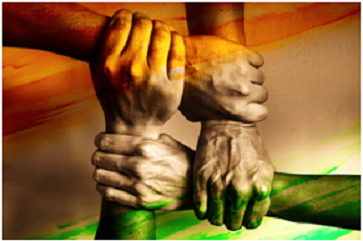Last Updated on May 31, 2019 1:51 pm by INDIAN AWAAZ

The last few years have witnessed India enhancing its global stature, transgressing the religious disparities to emerge as a ‘united nation’. From a country once divided by caste, creed and religion, India is now getting united in public welfare. Recent elections has demonstrated a testimony of this, where the well-being of people over powered difference of caste, creed, religion etc. Mr Narendra Modi has United the Divided India by embarking on welfare schemes.
Regardless of the country’s diversity, there exists ‘uniformity and equality’ in all matters pertaining to the laws and policies for every religious community.No policy or laws are implemented to benefit any specific community of people. Rather, they aim at giving benefit to the society at large, solving serious issues of the country. Various initiatives taken by different political parties positively impacted the lives of Indian citizens irrespective of any caste/religion difference, time and again.
Ensuring at least 100 days of wage employment to each household for undertaking unskilled manual work —the Mahatma Gandhi National Rural Employment Guarantee Act (MNREGA); Pradhan Mantri Jeevan Jyoti Bima Yojna (PMJJBY) targeting the low income sections of the society; and the Pradhan Mantri Jan DhanYojna (PMJDY) aimed at increasing the access of financial services like bank accounts, remittances, credit, insurance and pensions, are just to name a few.
Samajwadi Pension scheme helped more than 45 lakh women in UP. Uttar Pradesh Government’s free laptop scheme was aimed at bridging the digital divide and empowering the youths of the state. The students who were lagging behind due to lack of resources benefited under this scheme. Ujjwala Yojana also tremendously benefitted citizens, where the government provides a subsidy of Rs 1,600 to state-owned fuel retailers for every free LPG gas connection that they give to poor households. This subsidy is intended to cover the security fee for the cylinder and the fitting charges. Amma Canteen by Tamil Nadu government, a chain of restaurants for the under privileged people of the society is also a great initiative for the poor and needy. In this scheme people who are economically unstable are able to purchase food in much cheaper rates than market price.
Addressing the concerns of the farmers, the government also launched a number of schemes and initiatives for the welfare of farmers since the growth of a nation is directly connected to their wellbeing. The National Mission for Sustainable Agriculture (NMSA) was launched for promoting sustainability in agriculture through appropriate measures for enhancing agriculture productivity mainly in rain-fed areas. With ‘Har Khet Ko Paani’ as its major aim, PMKSY was launched for ensuring proper irrigation supply chain through water sources, distribution network and farm level applications.
In its attempt to evoke a sense of responsibility among the citizens, the government came up with the Swachh Bharat Abhiyan on October 2nd, 2014. Deemed as one of the most significant cleanliness campaigns, it aimed at achieving the vision of a ‘Clean India’. Beti Bachao, Beti Padhao Yojana (BBBP) is yet another initiative which brought about a transformational shift in the way the society looked at the girl child, believes Sanjay Dalmia. It was launched with an aim of keeping a check on the declining Child Sex Ratio (CSR), in all the religious groups across the length and breadth of the country.
Certainly, the successful impact of government’s initiatives is well reflected in the country’s overall and ‘unbiased’ progress. It is a challenge for every political party to continue this scheme of people’s welfare and rise above caste, creed, religion and other divides of society.Progressing commendably since its transition from a ‘divided’ to a ‘unified’ nation, the country is sure to emerge as a‘superpower’ in the years to come.
PROMOTIONAL CONTENT

